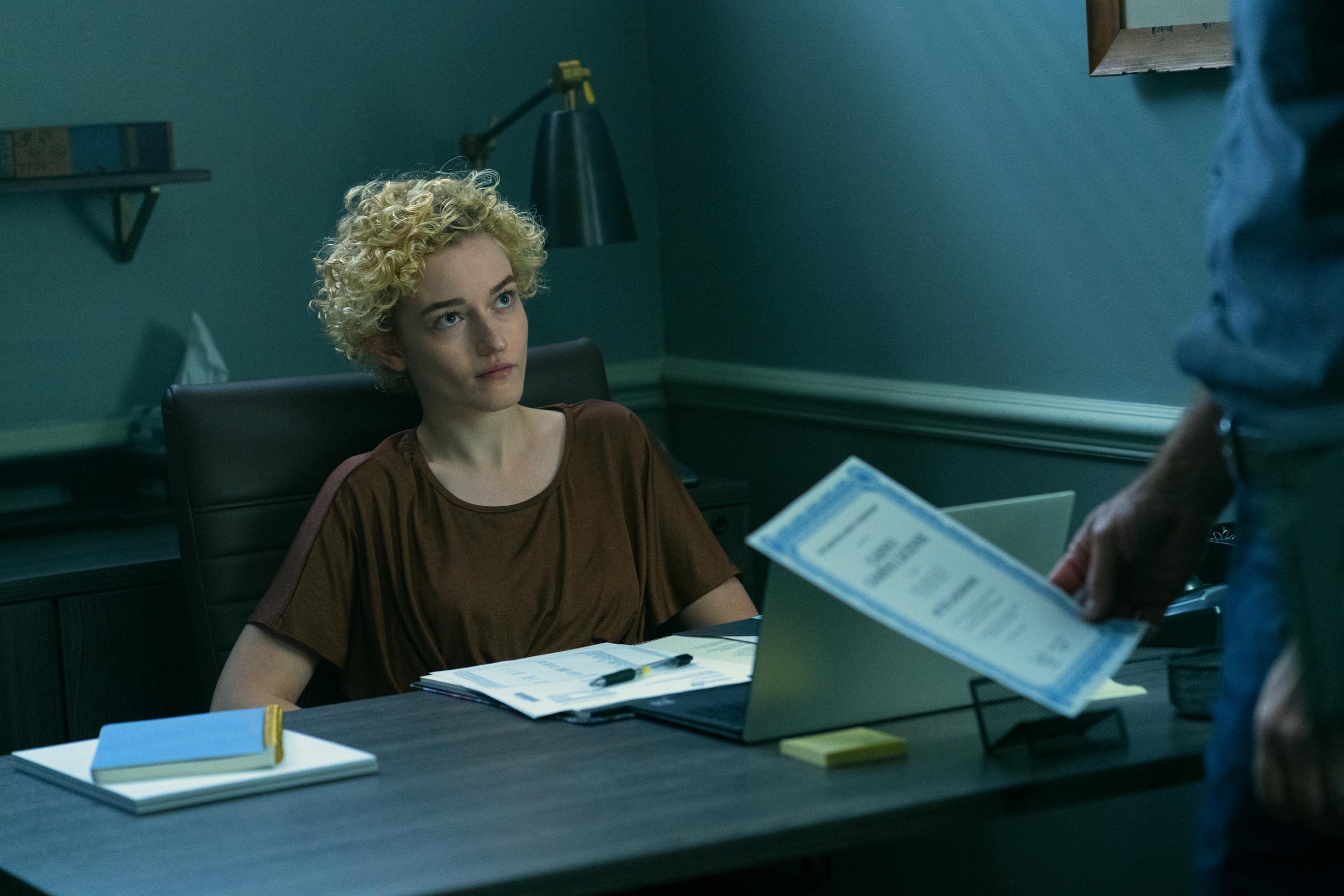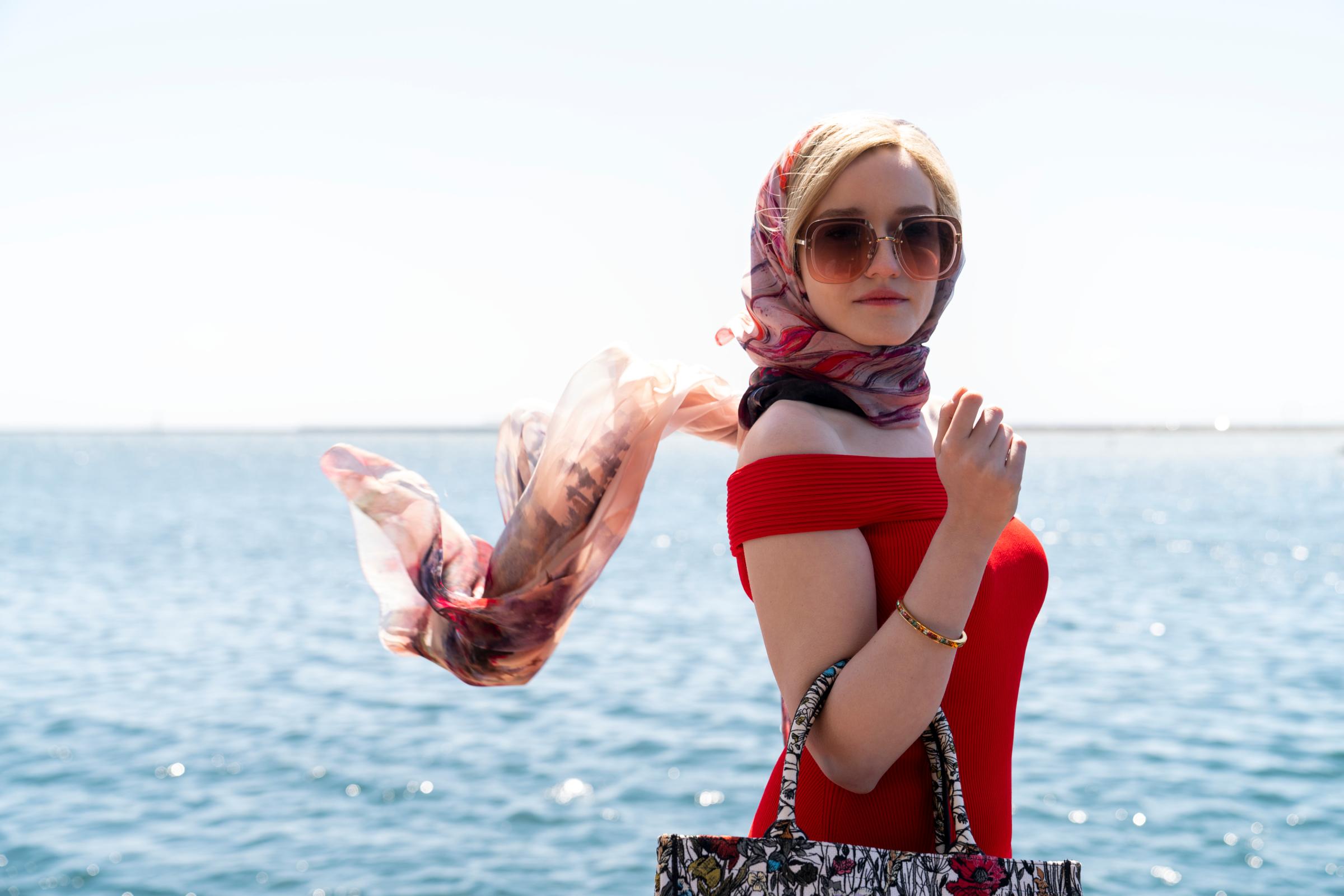Warning: Major spoilers ahead for the final season of Ozark
Julia Garner apologizes for talking in the third person, but she swears it’s the only way she can tell the story of how she learned her character Ruth Langmore’s fate on the final season of Netflix’s Ozark. Before each season of the drama, which looks at how Jason’s Bateman’s mild-mannered financial advisor Marty Byrde began laundering money for a Mexican drug cartel, Garner meditates to center herself. “I know this sounds crazy, but [while meditating] I try to remove myself completely and become Ruth,” she told TIME. “I’m half-asleep, half-awake [while doing this] so it’s this subconscious-type thing and I ask myself, as Ruth, questions.”
One of the questions Garner asked Ruth as she prepared for the show’s fourth and final season was what she was afraid of. “She told me she was afraid to die,” Garner says. “Which was very weird because Ruth is never afraid to die. Ruth thinks she can handle anything.” Less than a minute after finishing that unsettling meditation session, Garner got a phone call from Ozark producer Chris Mundy asking if they could talk about the final season. “I said, Am I going to die? He’s like, How did you know? Honestly, I told him, I didn’t know, but Ruth knew that she wasn’t going to be an old lady.”
The second half of season 4, which is now streaming, begins with Ruth on a mission to murder Javi (Alfonso Herrera), the unhinged Mexican drug cartel leader who killed her cousin Wyatt (Charlie Tahan). It concludes with Javi’s mom Camila (Veronica Falcón) shooting Ruth for taking her son’s life. It’s a bittersweet end for a beloved character who evolved from a small-time criminal into Marty’s money laundering protégé and then into a legit businesswoman.
Making the series felt like a transformative experience for Garner, who also stars in Netflix’s hit series Inventing Anna. “Ozark is not just a page in my book, it’s chapters of it,” she said. “It’s not just a job. It’s a part of me.”
Before the final season started streaming, Garner spoke to TIME about filming her final Ozark scene, becoming real-life scammer Anna Delvey, and why she thinks the Byrdes will never win.
You finished filming Ozark in January. How are you feeling now that fans will finally learn Ruth’s fate?
It’s really bittersweet. From an artistic point of view, I feel like ending on a high note like this is probably the smartest move. You don’t ever want to be the last person leaving the party. Personally, and selfishly, I could shoot this show until I’m 70 years old. I know that every actor promoting their project always says, It was like a family. But this was actually like a family. [Laughs] Jason [Bateman], Laura [Linney], and everybody on the show is so talented and respects each other artistically and personally. It was a dream. It was such a personal experience. It makes it harder in some ways to be on other sets because I have this sort of Ozark standard in a way.

What has been the hardest part of saying goodbye to Ruth?
It almost feels like a part of me has died in a way. Ruth gave me so much, not only as an actor but also as a person. She gave me a sense of confidence that I didn’t have before. She gave me that. It’s weird because in the middle of filming I have more in common with my character than with myself. I’ll wonder, Why am I feeling like this? and I’ll think about it and go, Oh, because my character is feeling that way. Does that make any sense?
Like that barrier between your true self and the version of you that people see on screen is less defined when you’re filming?
Yeah, it’s weird. Emotions are contagious. When [Ruth’s cousin] Wyatt died [in the season 4 part 1 finale], I think a part of Ruth died. She was physically alive, but her soul died. Not to get really depressing, but that was my mindset for a year [while preparing and filming the final season]. It was very depressing to feel like that, but that’s why they’re so amazing on set. Because everybody was so light and wonderful that it made it easier to wake up the next morning knowing that you’re surrounded by people who love you.
Can you talk about filming Ruth’s final scene?
It felt like I was dying. My death was also the last scene of Ozark. I think the last shot we did was me on the ground. I really do think Ruth died when Wyatt died. I think her body was just here. She wasn’t going to voluntarily quit life, but I think she was so dead inside that if given an opportunity to die, she wouldn’t say no. In the end, it’s not her going over to death, it’s death coming over to her. By the end of the season, she didn’t care about living. She did what she needed to do, she killed Javi, and after that mission, she was like a ghost.
Ruth loses her life, but the Byrdes seem to have it all. They found a way to go straight while still breaking bad. Do you think the Byrdes won?
I don’t view it as the Byrdes winning, even if they think they’re winning. I think they’re lying to themselves. They might have won the battle, but they didn’t win the war. When you get your hands that dirty, they can never be clean. People are not meant to do things like they’ve done, you know? I think of the simplicity of an animal: they love, they fight, they have sex, they hate. People are like that, but the only difference is that people have money and that makes people less simple, because money is never simple.

On paper, your Inventing Anna character, scam artist Anna Delvey, and Ruth couldn’t be more different, but do you think those characters have anything in common?
They’re both ruthless women. People are very attracted to people, specifically women, that have a ruthless way about them. That’s a sense of confidence, and there’s nothing more attractive than having full ownership of yourself.
Do you think Anna and Ruth would be friends?
I think in the beginning they would judge each other, like, hardcore. Anna is such a girl’s girl, but Ruth is not. I think Ruth always longs to have that female validation and kind of secretly wants to be a part of the girl’s club in a way, but she only knows how to talk to men. She’s like a bossy girl on the playground bossing all the boys basically. But then they would realize that they could team up, like, Oh, you like surprising people? I also like surprising people. Let’s surprise people together! [Laughs]
Many have questioned whether Anna ever felt remorse for what she did. After spending a bit of time with her in preparation for Inventing Anna, what do you think?
I view that whole story like it was a trauma for everybody. I think it’s a trauma for Rachel [Williams], Anna’s lawyer [Todd Spodek], [journalist] Jessica Pressler. I also think it’s a trauma for Anna Delvey. So for me, [the question of], Do you have sympathy for her? That’s black and white. A trauma is a trauma, and every single person in the world has a trauma. It might not seem like a trauma to us, but we’re not in that person’s shoes. I play people, I don’t play caricatures, and as soon as you play a caricature it’s going to be one-note and one-dimensional. I mean Ruth killed her uncles in season 1 [of Ozark] and people forget about that because it was an ongoing series. There was more time for people to forgive that character. You could have said that Ruth was a sociopath, but no one’s saying that. People don’t have to like the characters that I play. I just want them to be open to understanding that person.
Anna has seen and shared her opinion on Inventing Anna since it premiered in February. Has she reached out to you to talk about the show?
No, I haven’t heard from her personally. I remember when I first met up with her, she asked me how I was going to play her. I told her, ‘My job is not for me to make people like you or hate you.’ At that time, she had no voice at all. I said to her, ‘My job is for people to be willing to understand why you did what you did. Whether it’s good or bad. I’m not saying what you did and how you went about it is a good thing, but I want people to be willing to question how you got to that place and why. That’s going to humanize you because right now, people are not viewing you like a human and you are. I want to remind people of that.’ I think that meant a lot to her.
This interview has been edited and condensed for clarity.
More Must-Reads from TIME
- Donald Trump Is TIME's 2024 Person of the Year
- Why We Chose Trump as Person of the Year
- Is Intermittent Fasting Good or Bad for You?
- The 100 Must-Read Books of 2024
- The 20 Best Christmas TV Episodes
- Column: If Optimism Feels Ridiculous Now, Try Hope
- The Future of Climate Action Is Trade Policy
- Merle Bombardieri Is Helping People Make the Baby Decision
Contact us at letters@time.com